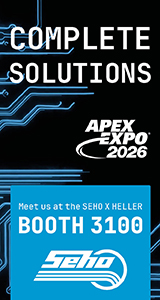|

|
|
| Ask the Experts | |||||||
|
|||||||
|
May 5, 2025 - Updated April 21, 2025 - Originally Posted Low Operating Temperature Lead-Free SolderWe will be soldering copper wires inside a motor that operates in a cold environment at -200 °C and cycles up to 100 °C. Which lead-free solder alloy is designed to endure this temperature cycle range? L/M. |
|||||||
| Expert Panel Responses | |||||||
|
An indium-containing solder would be best for this very low-temperature application. In100 (100% In) is however extremely soft. For this reason, an alloy of 97In3Ag (97% Indium, 3% Silver) would be suggested for the added strength that the Ag provides. This does lower the melting point from 157°C to 143°C, however it should still meet the need for the top of your temperature range.
Process Engineer Astronautics Fritz's career in electronics manufacturing has included diverse engineering roles including PWB fabrication, thick film print & fire, SMT and wave/selective solder process engineering, and electronics materials development and marketing. Fritz's educational background is in mechanical engineering with an emphasis on materials science. Design of Experiments (DoE) techniques have been an area of independent study. Fritz has published over a dozen papers at various industry conferences.
For soldering copper wires inside motors exposed to extreme temperature cycling from -200 °C to +100 °C, standard lead-free solders like SAC305 or SnCu are not suitable, as they tend to become brittle under cryogenic conditions. We recommend using indium-based solder alloys, such as:
Although we are not affiliated with Indium Corporation, they currently hold key patents and offer proven performance for cryogenic and aerospace-grade solders. Other commercial brands to consider for high-reliability and specialty solder applications include:
Depending on your region and supply chain, these companies may offer equivalent indium-based alloys or alternative cryogenic-capable solutions. We recommend consulting their technical data sheets and requesting samples when possible.
Engineering Director / Master IPC Trainer (MIT) AMMSA Solutions More than 20 years of technical experience in the electronics industry in roles ranging from Process & Project Engineer to engineering manager and Technical Applications Engineer for Latin Americas. IPC Master Trainer, International speaker and consultant.
Usually solder is tested/cycled from -40 C to 150 C. I’d recommend you contact the solder manufacturer for information on a larger operating range.
Senior Manufacturing Engineer Northrop Grumman Edithel is a chemical engineer with 20 year experience in manufacturing & process development for electronic contract manufacturers in US as well as some major OEM's. Involved in SMT, Reflow, Wave and other assembly operations entailing conformal coating and robotics.
I understand that Sn/In alloys are useful for low temperature applications as they maintain some ductility at low temperatures. Additives are carefully selected for Sn/In alloys to improve performance characteristics. I suggest contacting suppliers of those alloys for more information.
Field Applications FCT Assembly Tony has worked in the electronics industry since 1994. He worked as a process engineer at a circuit board manufacturer for 5 years. Since 1999, Tony has worked for FCT Companies as a laboratory manager, facility manager, and most recently a field application engineer. He has extensive experience doing research and development, quality control, and technical service with products used to manufacture and assemble printed circuit boards. He holds B.S. and M.B.S. degrees in Chemistry.
|
|||||||
| Submit A Comment | |||||||
|
Comments are reviewed prior to posting. You must include your full name to have your comments posted. We will not post your email address. |
|
Free Newsletter Subscription
Circuitnet is built for professionals who bear the responsibility of looking ahead, imagining the future, and preparing for it. Insert Your Email Address |
|

|






